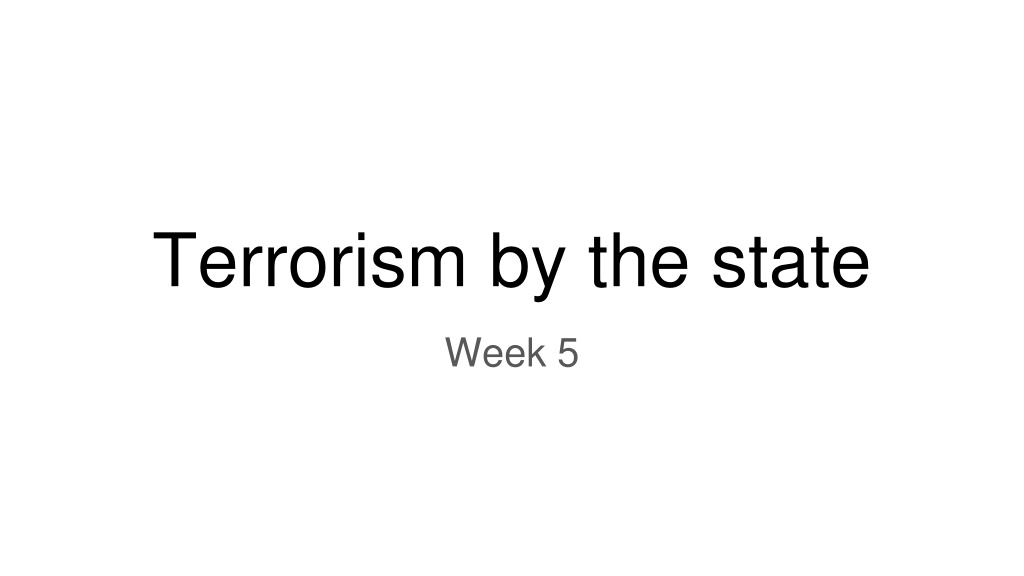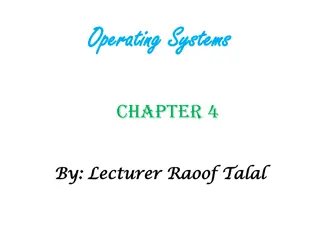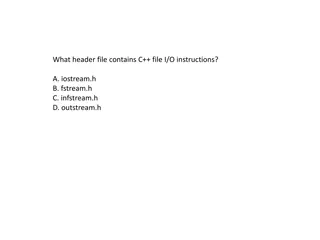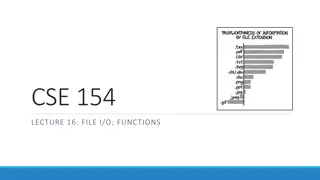Understanding State Terrorism and Its Implications on Society
State terrorism, employed by governments or factions within them, poses a grave threat to citizens and international peace. This form of terrorism includes intimidation, coerced conversion, and genocide as tools to maintain control. Dictators find it easier to carry out state terrorism in secret, often using it to suppress dissent and exert dominance. External terrorism, utilized in foreign policy, involves state support of terrorist groups to instill fear and chaos in hostile regions. Understanding the dynamics and impact of state terrorism is crucial for addressing human rights violations and promoting global stability.
Download Presentation

Please find below an Image/Link to download the presentation.
The content on the website is provided AS IS for your information and personal use only. It may not be sold, licensed, or shared on other websites without obtaining consent from the author. Download presentation by click this link. If you encounter any issues during the download, it is possible that the publisher has removed the file from their server.
E N D
Presentation Transcript
Terrorism by the state Week 5
Why do political leaders resort to the use of terror tactics?
What is state terrorism? Britannica: employed by governments - or more often by factions within governments - against that government s citizens, against factions within the government, or against foreign governments or groups Internal and External Terrorism
Internal terrorism Three levels of internal state terrorism: Intimidation: government tries to anticipate and discourage opposition and dissent Coerced conversion: involving government efforts to create a complete change in a national lifestyle Genocide: deliberate effort to exterminate an entire class, ethnic group, or religious group of people
Dictators found it easier to commit terrorism without world censure than have individuals, because state terrorism is committed in secret. Dozens of nations today use terrorism as (unofficial) government policy to secure and ensure control over their citizens. According to Amnesty International, torture is still widespread. Experts on torture have been exchanges from country to country. Tortures are classified as covert state terror because few states openly admit to practicing it. Terrorist regimes have been far more deadly than group or individual actors in the 20th century. State terrorism is frequently a nasty combination of personality and ideology. State terrorism not only transgresses international law, but it often creates political, economic and social milieu that precipitates acts of individual and group terrorism.
External terrorism Terrorism is used by national leaders as an instrument of foreign policy, particularly in the waging of irregular warfare. Two subcategories State-directed: larger involvement of state in decision making and control of activities State-supported: state usually aids or abets existing terrorist groups that have varying degrees of independence Since clandestine operations are by their nature conducted in secrecy, they are often difficult to document. Both forms of terrorism are used to produce fear and chaos within potentially unfriendly or hostile states. Such support offers a low-risk avenue for redressing an international grievance. Eg. Some Arab states chose to sponsor Palestinian terrorist groups as a less risky method of redressing Palestinian problem























